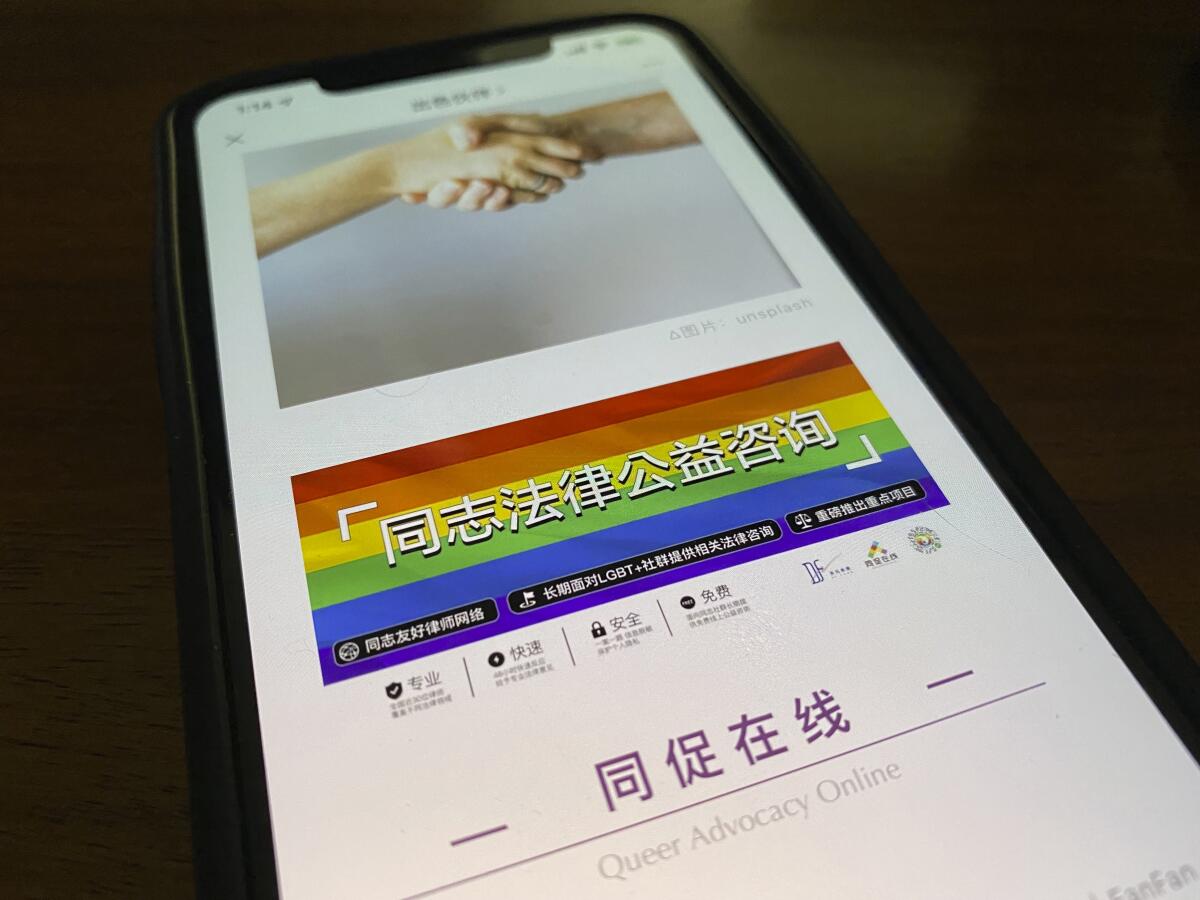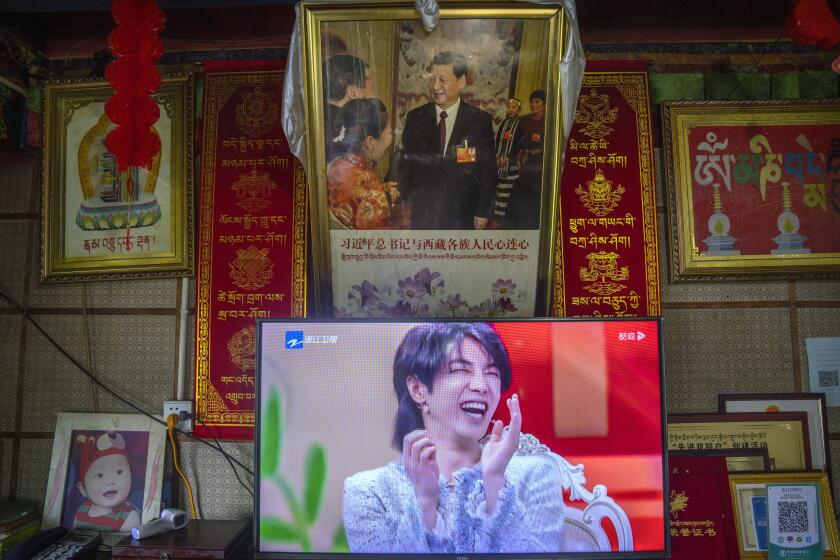Chinese LGBTQ rights group shuts down as government tightens social controls

- Share via
TAIPEI, Taiwan — An LGBTQ advocacy group in China that has spearheaded many of the country’s legal cases pushing for greater rights is halting its work for the foreseeable future.
LGBT Rights Advocacy China announced Thursday on social media that it was ceasing all activities and shutting down its social media accounts.
“We are deeply regretful to tell everyone, Queer Advocacy Online will stop all of our work indefinitely,” the group said on WeChat, using the name of its social media account. It closed its accounts on WeChat and Weibo, two widely used platforms in China.
A member confirmed that all the group’s activities have been shut down. The member, who spoke to the Associated Press on condition of anonymity because of safety concerns, declined to say why. Group founder Peng Yanzi did not respond to a request for comment.
LGBT Rights Advocacy China did work across the country, pushing for the rights of gay people and raising awareness about the community. It advocated for same-sex marriage and fought workplace discrimination by helping individuals sue their former employers.
While there are many other groups in China focused on helping LGBTQ individuals, LGBT Rights Advocacy was one of a handful that focused on changing law and policy.
For seven Chinese gay couples, a trip to California offered something that wasn’t legal at home: marriage certificates.
On Friday, China’s Ministry of Civil Affairs announced that it had dealt with 3,300 illegal social organizations, according to the official Xinhua News Agency. The ministry also shut down some 200 illegal websites and individual social media accounts that were not registered with any government entity.
It is unclear if LGBT Rights Advocacy was shut down as part of the government campaign. The ministry did not immediately respond to a faxed request for comment.
The group had mentioned that it was in trouble a few months ago, said an LGBTQ activist who knows the group’s founders and who spoke on condition of anonymity. Lawyers who helped the group with cases had also stopped their work then.
LGBT Rights Advocacy China was co-founded by Peng and fellow activist AQiang in 2013, and focused its efforts on securing legal rights for LGBTQ individuals through strategic lawsuits.
China’s government has banned supposedly effeminate men on TV and told broadcasters to promote ‘revolutionary culture’ to bolster official morality.
One of its most high-profile cases came early on in 2014, when Peng himself went undercover to a facility that claimed it could “treat” homosexuality with electroshock therapy. He sued the company and won.
The group often brought landmark cases to the court, challenging the law to make space for nontraditional families, and often helped start public discussions on those issues.
In April last year, they helped a lesbian sue for custody rights for her children, after her partner took them and stopped communicating with her. She had given birth to one of the two children. Under Chinese law, she could claim she was the birth mother of one child, but wanted to fight for the right to see the other as well. Her case is still in court.
The group also helped a young woman sue publishers of textbooks that called homosexuality a disorder, in a case that gained national prominence and was reported on by state media. She lost the case in February, after years of litigation.
Most but not all of ‘Friends: The Reunion’ is airing in China: LGBTQ references and appearances by BTS, Lady Gaga and Justin Bieber have been cut.
“In the entire community, they gave us a lot of hope and guidance, giving everyone the confidence to go out there and do something,” said a 34-year-old man who sued his former employer in 2018 for discrimination and won with the help of the group. He declined to be named for fear of reprisal, citing the current environment.
Homosexuality is not a crime in China, and in bigger cities, there’s a vibrant social scene where LGBTQ individuals can socialize without much fear or discrimination. However, restrictions on advocacy groups and online censorship has grown, those in the LGBTQ community say.
In July, WeChat shut down dozens of accounts run by university students and nonprofit groups on LGBTQ topics.
One LGBTQ blogger, who also declined to be named for fear of retribution, said it was getting increasingly difficult to run an LGBTQ group, noting that WeChat and other social media platforms are deleting related content.
Start your day right
Sign up for Essential California for the L.A. Times biggest news, features and recommendations in your inbox six days a week.
You may occasionally receive promotional content from the Los Angeles Times.
Shanghai Pride canceled its annual event in 2020 without explanation after 11 years of operation and said it would no longer hold it.
Another well-known group, True Self, which often held events to teach families how to accept their LGBTQ children, would tell people to not mention the word “gay” in publicizing their events, said the man who had previously sued his employer for discrimination. “The space for acceptance for sexual minorities is less and less,” he said. “It’s not like before.”
Pandemic restrictions also played a role in cutting down on the number of events the groups held, he added.
For now, LGBTQ groups are struggling to operate within the constraints.
“The future may bring more uncertainties, we await the day when we can lift the clouds and see the daylight,” LGBT Rights Advocacy China said in a post.
More to Read
Sign up for Essential California
The most important California stories and recommendations in your inbox every morning.
You may occasionally receive promotional content from the Los Angeles Times.











